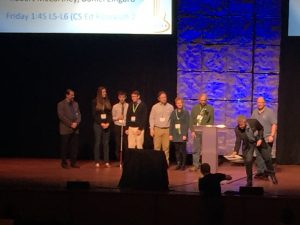SIGCSE 2023 in Toronto will debut a new special session, Spiffy Peer Instruction, which will showcase the best peer instruction questions submissions from the SIGCSE community. In addition to the opportunity to present the questions at the special session, winning questions will be archived on this website. You are invited to submit your questions here, due January 30. To celebrate this new community-building tool for Peer Instruction practitioners, we’re relaunching the website with a brand new design, new sections, and new features! Coming soon in March 2023!
All posts by pi4cs_admin
SIGCSE 2019: “Top 10” Nominee and new paper!
Thank you, SIGCSE community, for recognizing Peer Instruction research’s impact on CS education by nominating the 2016 paper, “A Multi-institutional Study of Peer Instruction in Introductory Computing” for the voting to decide which papers are the Top 10 in the 50-year history of SIGCSE! We’re honored, and the work on Peer Instruction continues with a new paper being presented, “Evaluation of Peer Instruction for Cybersecurity Education.” Catch that talk on Friday 1:45-2:10 in Hyatt: Greenway D/E (2nd floor).
Meet us in Seattle! “Peer Instruction in Practice” Workshop at SIGCSE 2017

Almost all of peerinstruction4CS’ content contributors will be in Seattle March 8-11 for SIGCSE 2017. You might be especially interested in the “Peer Instruction in Practice” Workshop featuring Cynthia Taylor and Joe Hummel of University of Illinois-Chicago; David Hovemeyer of York College, and David Bunde, John Dooley and Jaime Spacco of Knox College.
The “Evidence Based Teaching Practices in CS” workshop featuring Briana Morrison, Mark Guzdial, Leo Porter, Beth Simon, and Cynthia Lee will also touch on peer instruction.
Meet us in Memphis: SIGCSE 2016
Almost all of peerinstruction4CS’ content contributors will be in Memphis March 2-5 for SIGCSE 2016. We are delighted and honored that research about PI, “A Multi-institutional Study of Peer Instruction in Introductory Computing,” has been named Best Paper! You can read this paper, and all our PI research results, on our latest research page.
Peer Instruction Faculty Workshop – July 21-23 – San Diego, CA
Peer Instruction in Computer Science: Focusing Classes on the Students
Location: San Diego, CA
Dates: July 21st-23th
Hosts: Leo Porter, Skidmore College; Cynthia Bailey Lee, Stanford University; and Beth Simon, UC San Diego
Do you find your students inattentive during lecture? Ever wonder what all the students are thinking, not just those few who ask questions? Do you want to see more of your students succeed and stay in the major? Peer Instruction may be your answer! Peer Instruction is a student-centric pedagogy which uses targeted conceptual questions (often with clickers) to identify student understanding. This allows the instructor to focus the class around core concepts and around material on which students struggle. Relative to lecture, research has shown it to improved student scores on final exams, dramatically reduce failure rates, and contribute to improve retention of CS majors.Moreover, students across a wide variety of institutions overwhelmingly value Peer Instruction and wish more faculty would use it in their classes. In this workshop, participants will attend actual Peer Instruction classes ongoing at UC San Diego, learn about the research supporting Peer Instruction and Peer instruction Best Practices, gain hands-on experience running Peer Instruction questions, and will work with experienced Peer Instruction instructors on adopting/developing Peer Instruction materials for their classes.
To register, please apply here by filling in your contact information (please note that SPACE IS LIMITED and applicants will be accepted first-come, first-serve):
https://www.surveymonkey.com/s/DD5TXPX After applying, we will respond to you shortly.
Continue reading Peer Instruction Faculty Workshop – July 21-23 – San Diego, CA
Discrete Mathematics Peer Instruction Materials
Topics Coverage Summary: propositional logic, prepositional logic, argument forms, direct proof, proof by contradiction, induction, diagonalization, cardinality, basic number theory
Number of Questions/Slides Available: 100
Materials Author: Cynthia Lee, Stanford University; Shachar Lovett, University of California, San Diego
Continue reading Discrete Mathematics Peer Instruction Materials
CS2 in C++ Peer Instruction Materials
Topics Coverage Summary: C++ basics, stack, queue, map, recursion, backtracking recursion, Big O, sorting, pointers and addresses, dynamic memory, classes, heaps, hashing, graphs, brief P vs NP.
Materials Author: Cynthia Lee, Stanford University
Continue reading CS2 in C++ Peer Instruction Materials
CS1 in Python Peer Instruction Materials
Topics Coverage Summary: variables, types, assignment, order of operations, lists, dictionaries, functions, scope, conditional statements, logical expressions, while loops, for loops
There are two separate editions of PI materials for CS1 in Python. One was developed by Daniel Zingaro of University of Toronto. The other was developed by Cynthia Taylor of Oberlin College.
Number of Questions/Slides Available: 100+
Materials Author: Daniel Zingaro, University of Toronto
Materials Author: Cynthia Taylor, Oberlin College
Continue reading CS1 in Python Peer Instruction Materials
CS2 in Java Peer Instruction Materials
Topics Coverage Summary: Use and implementation of basic data structures including linked lists, stacks, and queues. Use of advanced structures such as binary trees and hash tables. Object-oriented design including interfaces, polymorphism, encapsulation, abstract data types, pre-/post-conditions. Recursion. Uses Java and Java Collections.
Number of Questions/Slides Available: Coming soon!
Materials Author: Cynthia Lee, Stanford University, adapted from slides by Paul Kube, UCSD
Continue reading CS2 in Java Peer Instruction Materials
Operating Systems Peer Instruction Materials
Topics Coverage Summary: This is an introductory course on the principles of operating systems. Topics include processes, scheduling, synchronization, memory management, virtual memory, file systems, I/O, protection, security, networking, and distributed systems. There is a significant systems programming component to the course, where students are required to design and implement some basic kernel functions (context switching, scheduling, synchronization) and a user-level thread package.
Number of Questions/Slides Available: 35
Materials Author: Kevin Webb, UCSD, and Cynthia Taylor, Oberlin College
Continue reading Operating Systems Peer Instruction Materials
